 |
 |
 |
 |
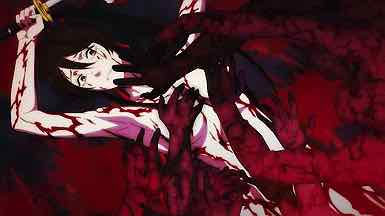 |
 |
 |
 |
 |
 |
 |
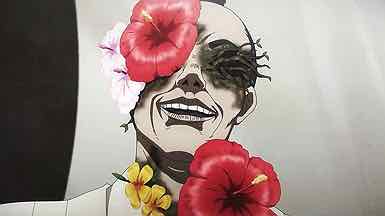 |
 |
 |
 |
 |
 |
 |
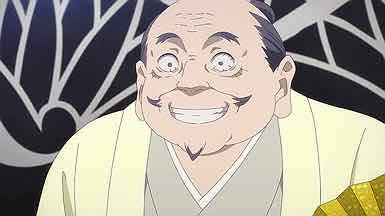 |
 |
 |
 |
 |
 |
 |
 |
 |
 |
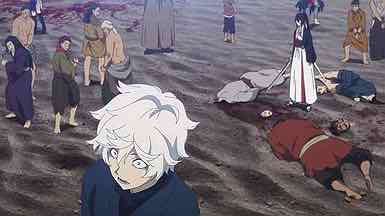 |
 |
 |
 |
 |
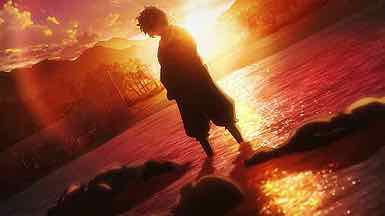 |
 |
 |
 |
 |
 |
 |
 |
 |
「選別と選択」 (Senbetsu to Sentaku)
“Screening and Choosing”
Jigokuraku is a very well executed (no pun intended) piece of work. You can tell that there’s some thought behind this premise, even if the series does trade pretty heavily in WSJ battle shounen tropes. I can see it being among the more “seinen-y” Jumpers, in the same way latter-stage Rurouni Kenshin and Hunter X Hunter (both clearly major influences) are. That said, there are a few yellow flags for me that are going to need to be cleared before I feel confident making a commitment.
That derivative nature is one of the things that worries me a bit. Hell’s Paradise plays a bit as if it’s cobbled together from pieces of other shounen – really good ones for the most part, but cobbled nonetheless. The other thing is that these first two eps, this one especially, have an air of violence porn about them. I get that Jigokuraku is a violent series about condemned murderers traveling to a land that kills (or worse) everyone who goes there. But this episode was really intent on graphically driving up the body count as high as possible. At some point I just tuned that out and waited for it to be over so I could start caring again. I get that it’s not pointless vis a vis how it relates to Sagiri’s arc, but seriously – that was literally overkill.
Sagiri is indeed the main focus of this episode, in much the way Gabimaru was the first. The context is important here. Japan has a caste system much like India does – it’s theoretically abolished today but in practice still exerts an influence in Japanese society (Google “Burakumin” if you want to learn more), but was in full force during the Tokugawa Shogunate. At the bottom of this system are the untouchables, kegare – anyone whose occupation was considered unclean. That was predominantly those linked with death, and executioners were considered part of that group.
The kind of discrimination we saw Sagiri enduring here was (and is) a very real thing in Japanese culture. The Yamada clan, for all their supposed skill, would be disdained and shunned by the higher castes. That’s the reality Sagiri has lived with since she was a child. It’s also something that links her with Gabimaru – both were raised to be killers, and both are fully cognizant of the karmic damage this inflicts on them. Gabimaru wanted out, and was sentenced to die for it. Sagiri hasn’t reached that point – for her, it’s about overcoming her doubts and being better at her job (in theory making her more merciful).
That’s all very interesting and a solid base to build on. This whole business of the condemned killers going through a mass slaughter for the fictional Tokugawa Nariyoshi’s entertainment was just silly. The point could have been made far more elegantly, but presumably Kaku Yuuji was trying to have a big impact moment early in the story. Also, Gabimaru’s speech about not wanting to kill anybody rings pretty hollow when he goes out and brutally executes a score of men who’d made no direct attack on him. That was pretty silly, too.
In sum, then, it seems like Jigokuraku has a bit of a split personality to it, and which one reigns supreme is going to be critical to its staying power for me. I’m rooting for Data – there’s a lot of threads in this story I’d love to follow, and it could almost be taken as a Buddhist parable. But if it’s Lore who wins and most episodes are like this one, I could see the appeal wearing thin relatively quickly. The stage where the meat of the story is taking place, Shinsenkyo, hasn’t even been reached yet so it’s certainly premature to make any guesses about which way things will go.

So I feel for Sagiri, being the child of an executioner and female in an era when the social norm was that Men do all the heavy lifting and Women will work the home. With the reputation of an executioner, this bad rep leaked onto Sagiri’s social life and made things difficult.
The victim with the foliage growing out of him, the fruiting body of some plant seems parasitic, Guessing the body provides nutrition for the vegetation growing out of the body. With the smile I am guessing the victim is euphoric. The victim’s brainwaves must be erratic. Is the pollen also parasitic as well?
…Why is everyone so close to the victim?
Dude of you actually paid attention and looked deeper, you would understand why Gabimaru says he won’t kill. It is not so simple. And it isn’t fucking silly!
The reason why it seemed silly is because in the scene right before, Gabimaru makes a pretty significant point of not wanting to kill anyone when just talking to one other guy. Then right after he explains this he kills the guy who wanted to kill him (fair enough). But then he goes and kills a bunch of other people. It’s definitely not a simple thing, however that quick switch from not wanting to kill anyone to killing multiple people basically spits in the face of what he just said. I don’t doubt he meant what he said, but narratively it’s strange.
Next episode will explain things better. I guarantee it.
I guess they don’t teach non-lethal take-downs in ninja school.
If those executioners are one of the lowest castes then i guess that would make more sense that they would be considered disposable as well. I mean if everyone that goes to that island is in danger then the monitors would be in real danger not just from the criminals as well right?